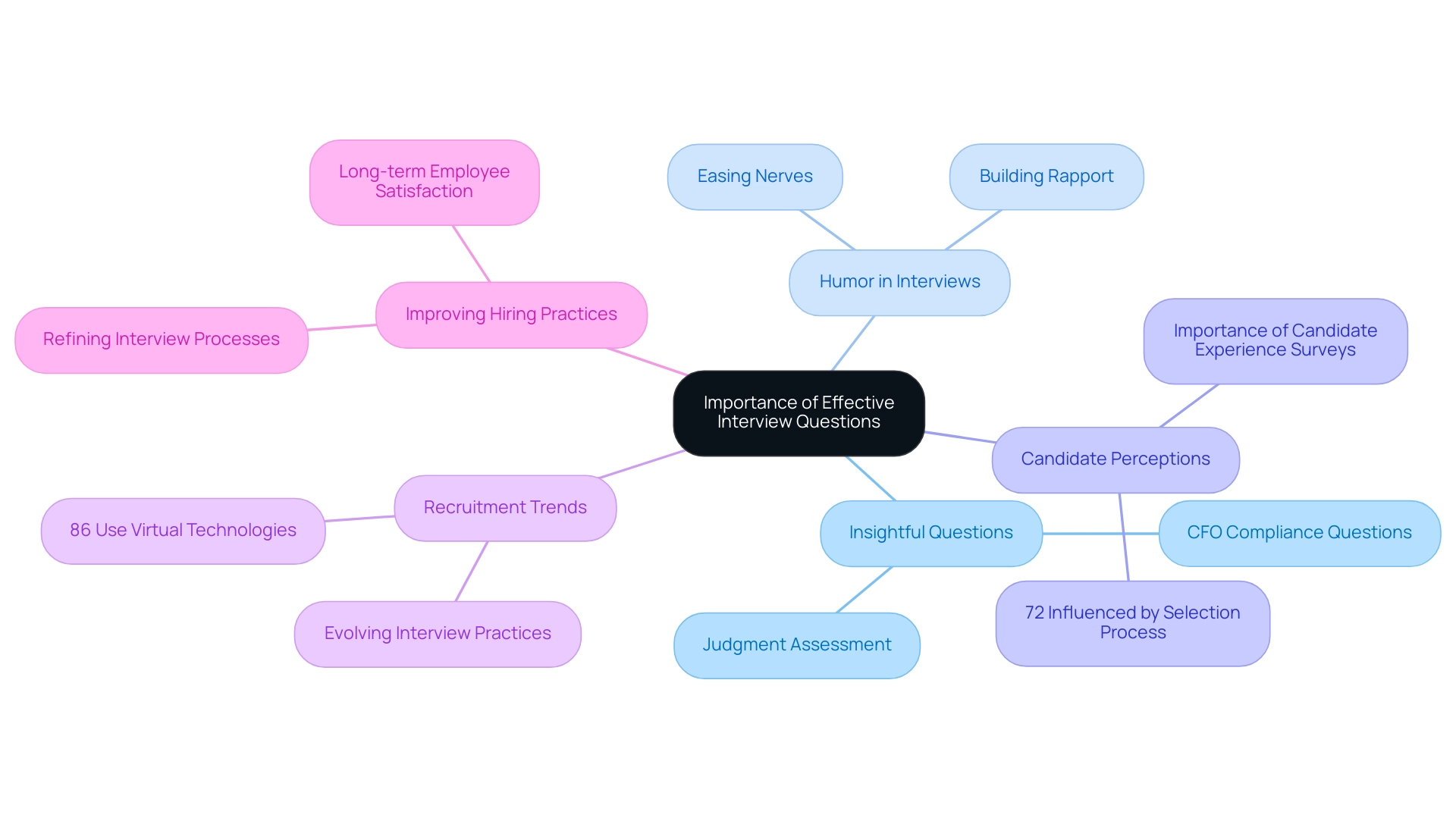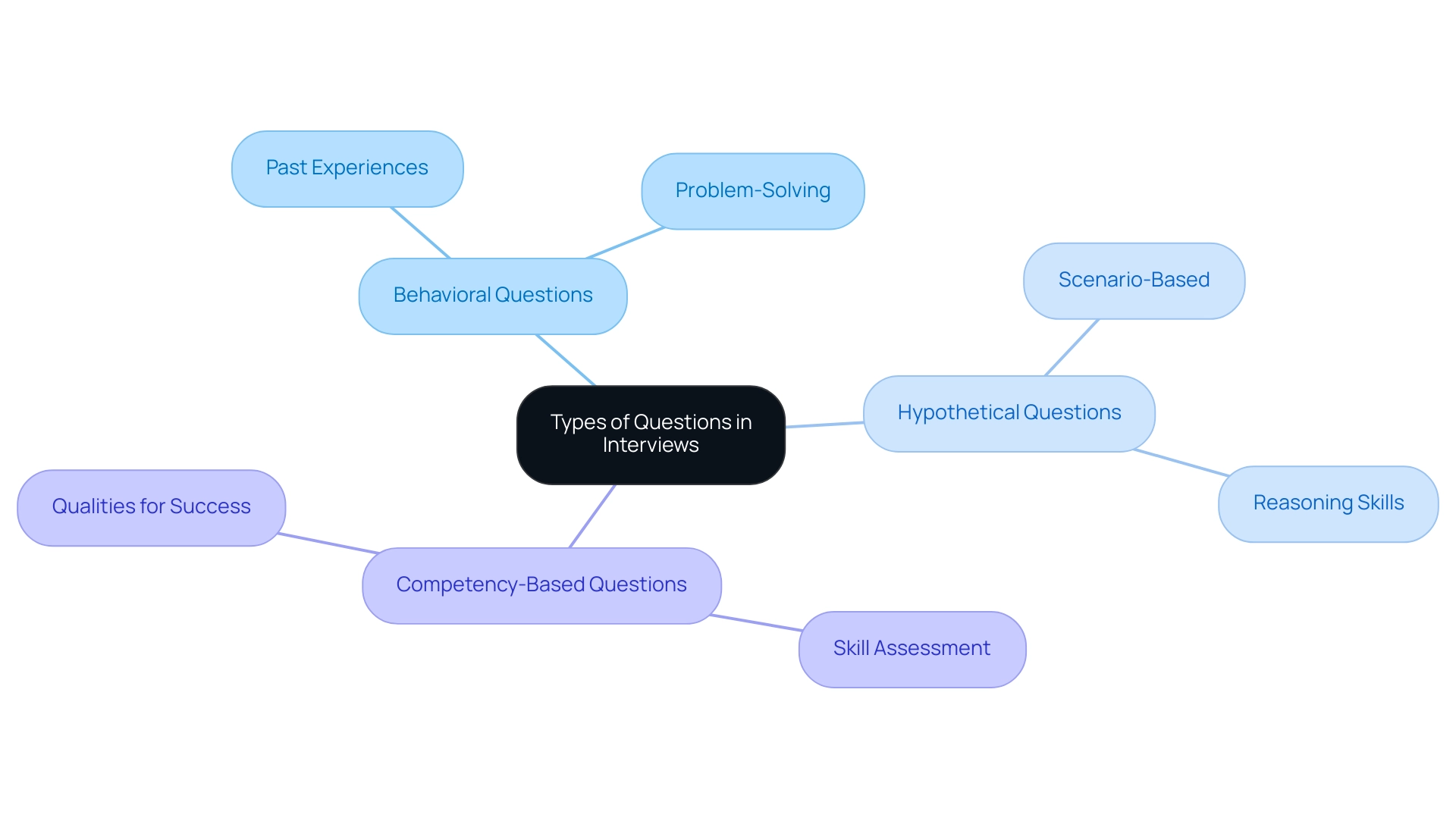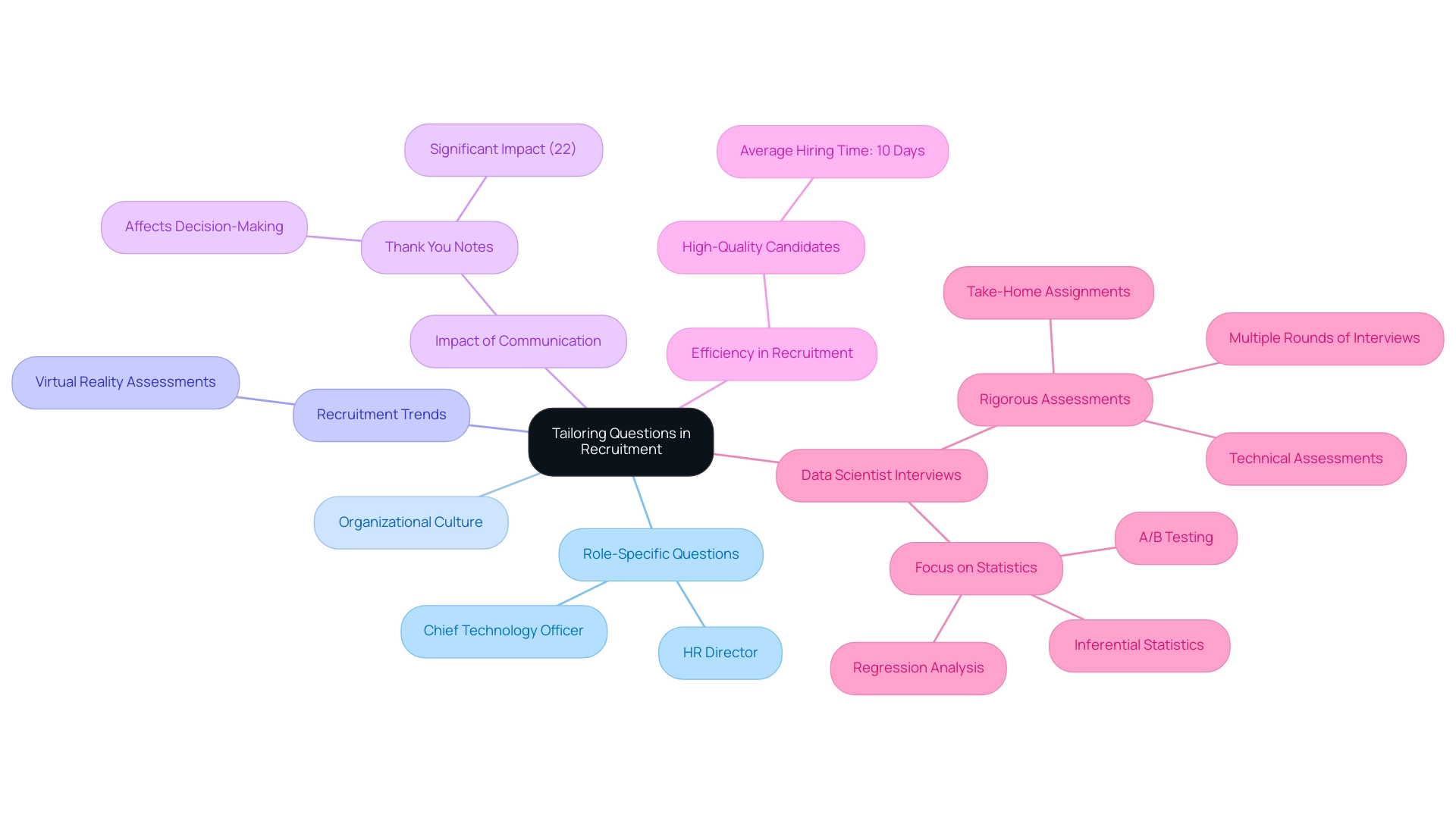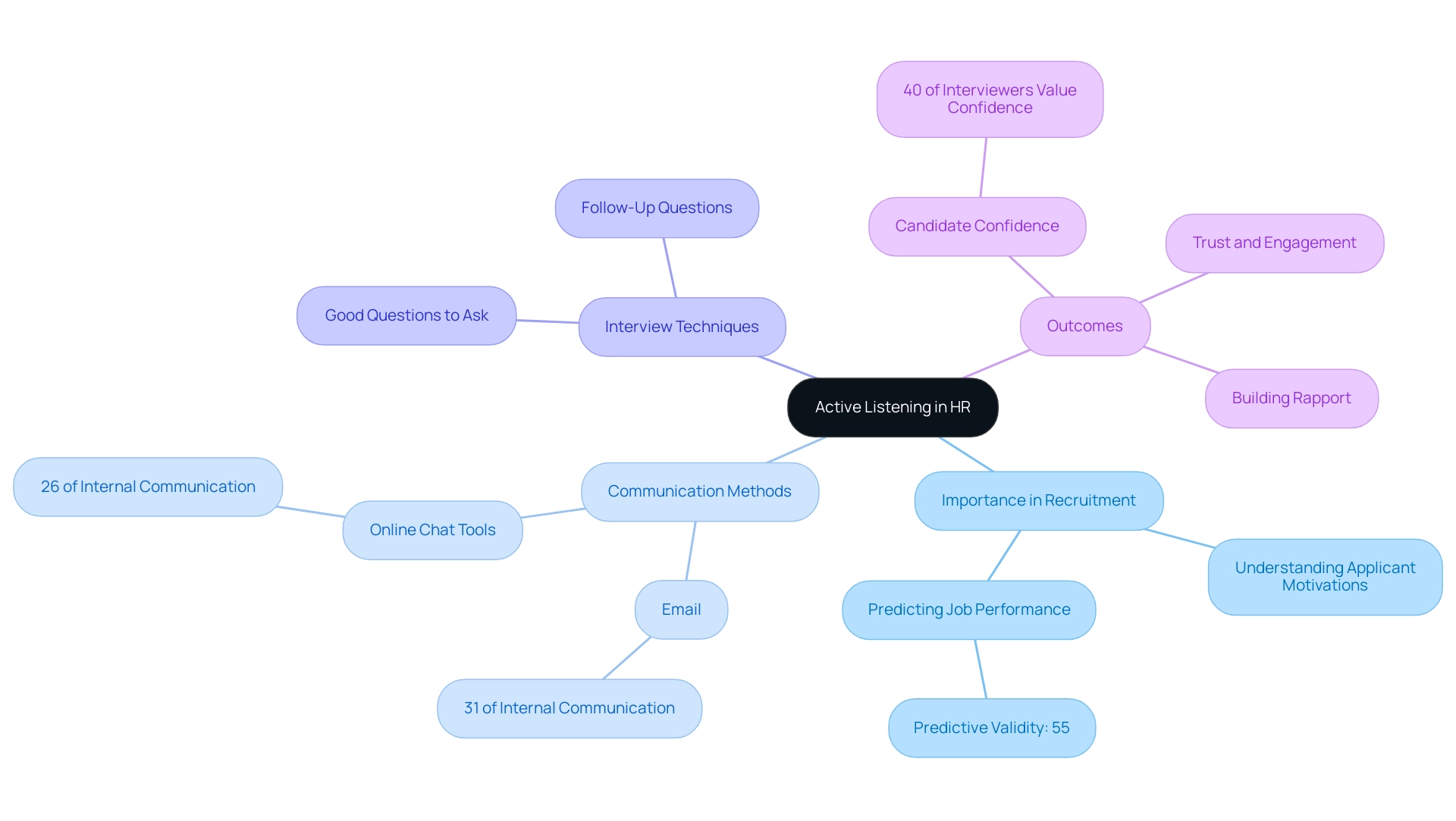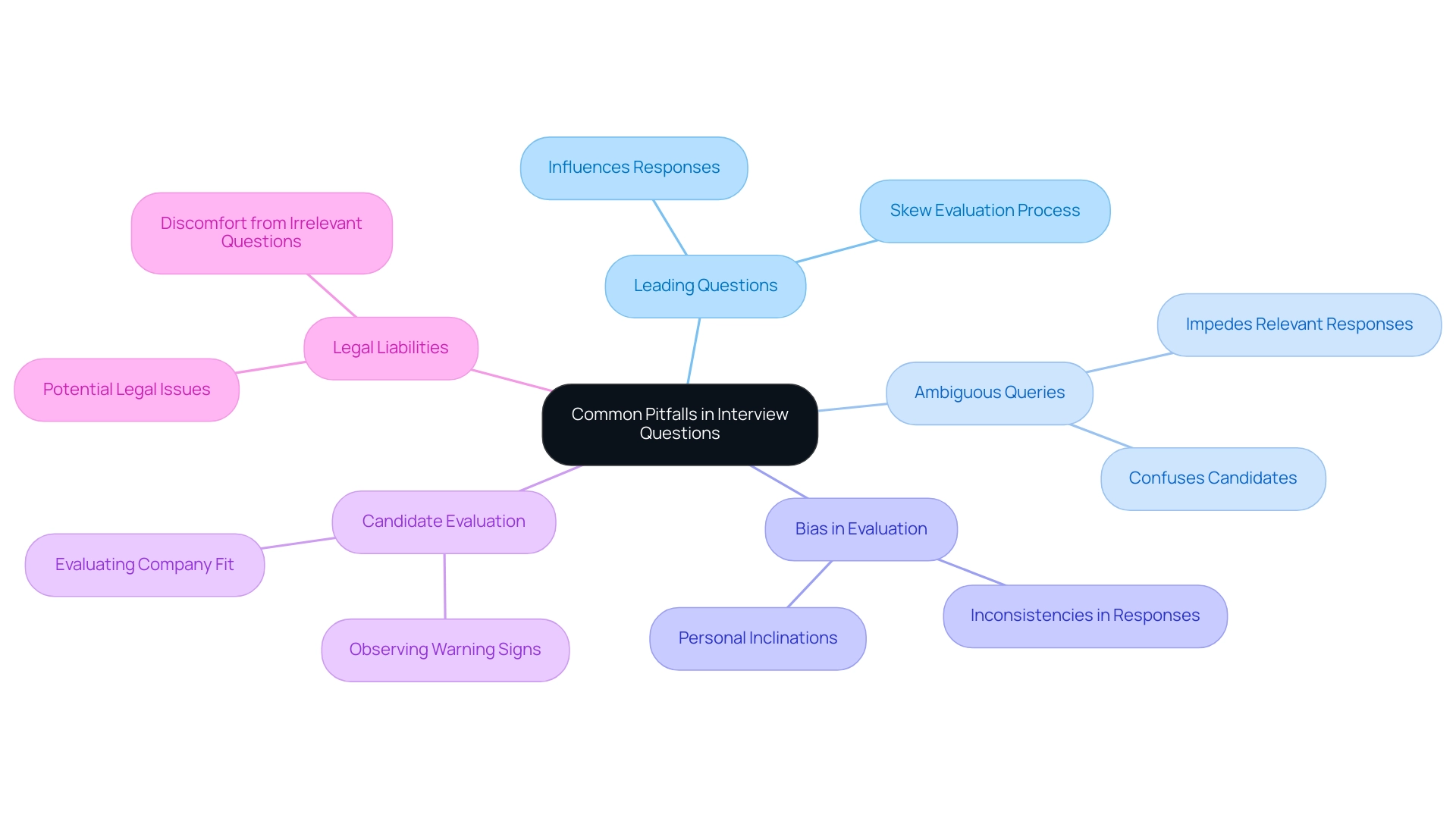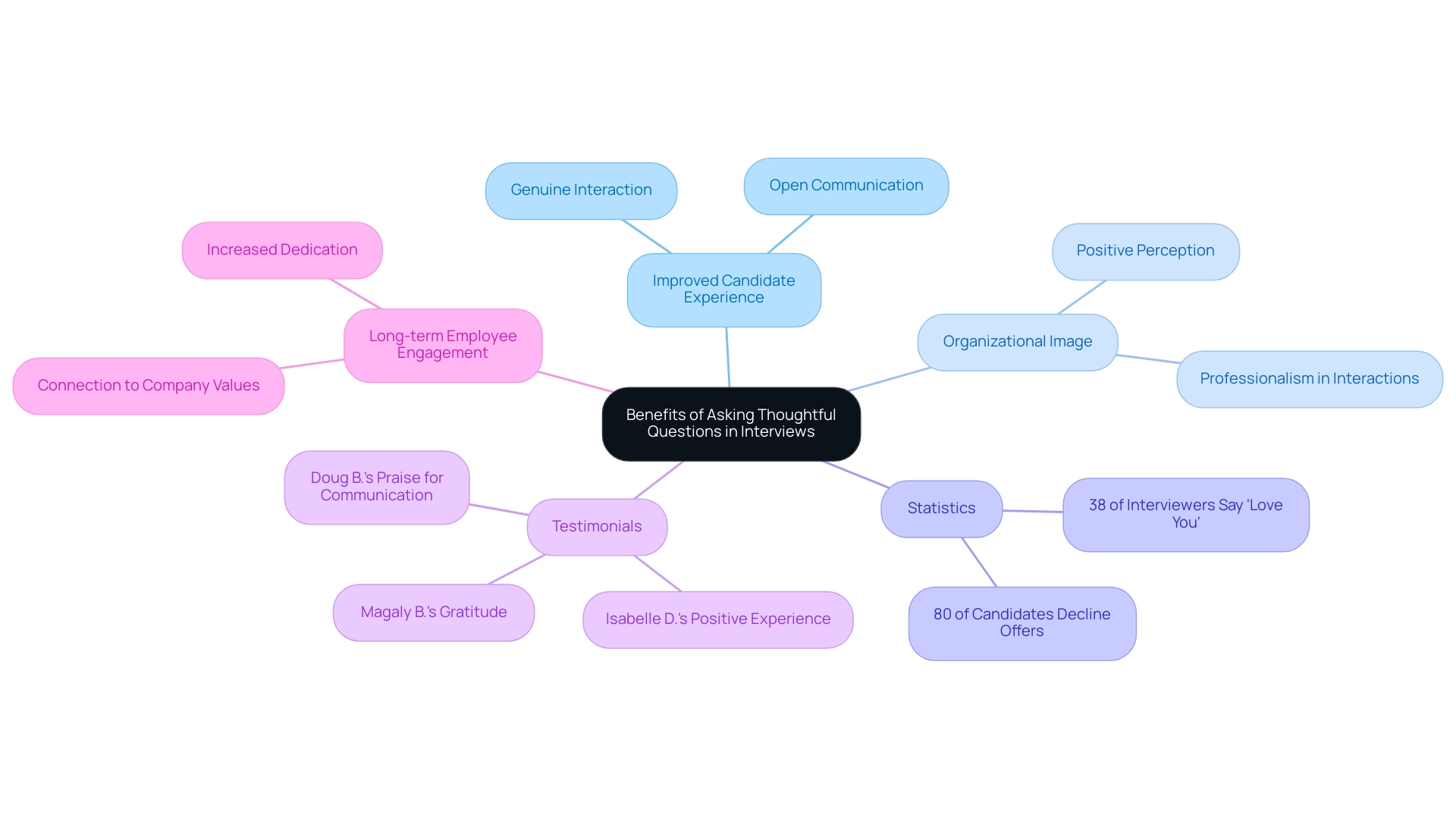Overview
Effective interview questions are essential for HR managers to accurately assess candidates’ abilities and fit within the organization, while also enhancing the candidate experience. The article emphasizes that incorporating behavioral and competency-based questions, along with active listening and transparency, significantly improves the selection process, as 72% of candidates believe that the effectiveness of this process influences their decision to accept job offers.
Key Highlights:
- Effective interview questions are crucial for assessing candidates’ abilities and alignment with organizational values.
- Incorporating humor can ease nerves and foster a comfortable interview environment.
- 72% of candidates believe that the selection process’s effectiveness influences their job offer acceptance.
- HR managers should utilize behavioral and competency-based questions to evaluate problem-solving and adaptability.
- Transparency about salary expectations and work conditions is essential to build trust with candidates.
- Active listening enhances understanding of applicants’ motivations and can predict job performance.
- Common pitfalls in interviews include leading questions and disorganization, which can deter top talent.
- Thoughtful questions improve the candidate experience and positively affect the organization’s reputation.
- 80% of job seekers may decline offers based on their interview experiences, highlighting the need for professionalism.
Introduction
In the world of talent recruitment, competition lies in the interview phase where candidates and companies meet to find the match. Navigating through the challenges of hiring in fields such as finance and technology makes asking the interview questions crucial. Thought-out questions not only showcase a candidate’s skills but also uncover how they resonate with the company’s ethos and environment. In addition to that, using methods like humour and paying attention actively can make the interview more interesting and conversational, building a sense of trust and connection. This piece explores the importance of creating questions, steering clear of typical mistakes, and improving the entire interview procedure to draw in and keep top-notch candidates.
The Importance of Effective Interview Questions
During discussions for roles such as CFO and IT Help Desk in high-demand sectors like financial services, where compliance and ethics are crucial, posing insightful questions is vital to comprehend the applicant’s abilities and alignment with the organisation’s values, beyond merely their qualifications and experience level. For instance, inquiring about the way a CFO applicant would manage a compliance concern can unveil their stance on judgment. Moreover, incorporating humour into employment discussions can influence applicant relationships and assist in easing nerves, creating a comfortable environment for candid conversations.
Data indicates that 72 percent of candidates believe that the effectiveness of the selection process significantly influences their decision to accept a job offer. It’s crucial for HR managers to focus on using questioning methods that improve the overall experience for job candidates—especially in fields like finance and technology that require specialised skills. Research shows that many employers have missed out on talent because of subpar interview processes; this underscores the importance of refining these practices.
Additionally, Gartner findings reveal that a significant 86% of companies are now embracing virtual technologies to conduct interviews—a clear indication of the evolving trends in recruitment practices. To enhance their hiring decisions, for long-term employee satisfaction and retention, HR managers can improve by asking about roles and incorporating humour effectively.
Types of Questions to Consider in Interviews
To assess individuals for desirable roles in finance and technology effectively, HR managers should use good questions to ask an interviewee in order to obtain a comprehensive understanding of each applicant’s qualifications. Behavioural inquiries are particularly beneficial because they provide good questions to ask an interviewee, allowing interviewers to investigate experiences and observe how applicants have dealt with specific challenges. Recent studies indicate that including inquiries can significantly enhance the evaluation of an individual’s problem-solving abilities.
In contrast to that are good questions to ask an interviewee, which provide insight into how applicants would handle hypothetical situations pertinent to the role and illuminate their reasoning and decision-making abilities. Taking it a step further are competency based queries that are good questions to ask an interviewee, pinpointing the skills and qualities essential for excelling in the position. By incorporating a variety of good questions to ask an interviewee into their assessments and making the experience more engaging for applicants in the HR field, it can create a dynamic and successful evaluation experience that reveals deeper insights into applicant skills while following effective industry standards that improve overall evaluation effectiveness—an important aspect given that 72% of individuals consider assessment efficiency vital in their decision to accept a job offer.
Developers should also openly discuss salary expectations and work conditions during evaluations to meet applicants’ desire for transparency. Job applicants should express their working setups. Be it a mix of office and remote work or fully remote.
And explain why this choice matters to them in detail. Acknowledging that half of job seekers feel anxious due to salary details and changing schedules emphasises the value of open communication. Along with that point, HR directors should recognise the importance of thank you messages as 80 percent of recruiters indicate that receiving a thank you note impacts their decision-making and 22 percent feel it has an effect on their choices.
This comprehensive strategy not only attracts top talent but also fosters trust and authenticity during the hiring phase.
Tailoring Questions to the Role and Organization
Customising inquiries to align with roles such as Chief Technology Officer and HR Director, along with the organisation’s culture, is essential for formulating good questions to ask an interviewee effectively in the competitive landscape of technical and HR recruitment. It is crucial to inquire about individuals’ problem-solving and adaptability experiences in firms that emphasise innovation. In the upcoming years, considering the rising use of virtual reality in evaluations anticipated by over half of HR professionals (53%), it is evident that there is a growing trend towards implementing more immersive assessment methods.
Moreover, and perhaps equally significant, is the comprehension of a company’s core values and mission by HR teams to formulate inquiries that can reveal individuals’ alignment with these guiding principles. By posing customised questions not only for assessing qualifications but also for assisting individuals in evaluating their compatibility with the organisation’s culture and values, a more comprehensive evaluation is facilitated from both perspectives. Creating a common understanding at the outset could significantly improve recruitment outcomes as exceptional individuals typically secure positions in as few as ten days on average – emphasising the efficiency of customised recruitment strategies, in accelerating the hiring timeline.
Furthermore, it’s important to highlight that 80 percent of recruiters state that receiving a thank you note affects their decision-making process, with a quarter suggesting it has a considerable impact; this emphasises the importance of interacting with and communicating effectively with candidates during the selection phase. Ultimately, developing good questions to ask an interviewee that align with the organisation’s values and practices used by recruitment firms boosts the effectiveness and engagement in discussions. This method is highlighted in discussions for Data Scientists that include practical tests and specific question styles centred around statistics demonstrating the personalised techniques needed to draw in top notch professionals from different sectors.
To find out more about how our tailored searches can address your companies requirements, get in touch with us today.
The Role of Follow-Up Questions and Active Listening
Active listening is regarded as a skill for HR managers during discussions as it assists them in understanding applicants’ replies and motivations more effectively. In today’s job market where top applicants carefully assess potential employers, organised assessments that utilise active listening techniques play a key role. Studies indicate that such discussions can predict job performance by 55%, which is essential for attracting the best talent.
Alongside that data point, 31 percent of internal communication occurring via email and 26 percent through online chat tools is quite significant regarding effective communication during discussions, which are essential. Good questions to ask an interviewee, including follow-up questions, contribute to enabling interviewers to explore deeper into applicants’ responses during conversations. This exchange helps reveal meaningful insights into their backgrounds and thinking patterns.
This engaging dialogue not only enhances the process but also builds rapport by demonstrating to participants that their input is valued and understood, which can include good questions to ask an interviewee. However, individuals are quick to notice warning signs like disorganisation and lack of clarity throughout the discussion phase. In interviews when you ask “Can you hear me?” it’s important to be clear and communicate effectively to avoid giving off an impression of disorganisation that might concern applicants.
One interesting finding is that 40% of interviewers believe that a person’s confidence level, which can be boosted by listening, plays a big role in their decision making when hiring. Active listening leads to conversations and strengthens trust and engagement, much like how good questions to ask an interviewee can foster regular feedback and acknowledgment in the workplace. This method doesn’t just improve outcomes; it also creates a connection between the interviewer and the candidate by addressing common hiring challenges that might deter exceptional individuals.
To ensure your recruitment process is efficient and appealing to candidates, let’s discuss methods to streamline your evaluations and eliminate any warning signs.
Common Pitfalls to Avoid in Interview Questions
Human resource managers have a responsibility in ensuring that the selection procedures are efficient and impartial in today’s highly competitive talent landscape. The top tier candidates are not merely interested in any position. They are searching for the perfect match, with the right organisation.
If the selection procedure is not conducted smoothly and flawlessly, organisations run the risk of losing talent to their competitors. It is crucial to be mindful of pitfalls when formulating good questions to ask an interviewee. For instance, leading questions can significantly influence how individuals respond, which could ultimately result in skewness of the evaluation process.
Moreover, astute and capable applicants are evaluating your company as much as you are evaluating them. They are observant for any warning signs during the assessment process. Applicants might pick up inconsistencies in responses, a lack of enthusiasm from interviewers, or unclear explanations regarding the job and its requirements.
Conducted discussions have become a recognised approach because they reduce bias and prejudice by focusing exclusively on applicants’ qualifications and abilities rather than personal inclinations. According to Adrian Olszewski’s explanation about prediction intervals as ‘prediction interval equals point estimate plus or minus margin of error,’ this concept can be handy during discussions to accurately understand applicants’ responses and prevent misinterpretations caused by answers. It is also worth noting that the law of numbers implies that with a higher number of evaluations conducted, the overall assessment of individuals will become more precise in reflecting their qualifications.
This underscores the significance of maintaining an impartial assessment procedure. Moreover, the example provided about p values demonstrates that when conducting a hypothesis test, if a p value is lower than or equal to the predetermined level of significance, it results in rejecting the hypothesis. This highlights the significance of preserving accuracy when evaluating candidates and recognising possible biases in questioning.
Ambiguous or overly intricate queries are not considered good questions to ask an interviewee, as they can bewilder individuals and impede their capacity to furnish pertinent responses. Questions delving into topics unrelated to the position may cause discomfort and expose the company to legal liabilities. By steering clear of these errors and ensuring a seamless selection process for applicants, HR professionals can uphold a high level of professionalism and attract top talent to make excellent hiring decisions ultimately.
Benefits of Asking Thoughtful Questions in Interviews
Inquiring during discussions provides greater advantages than merely identifying the suitable individual for the position at hand. It helps us grasp an understanding of the interviewee and improves their overall experience. This positive interaction also plays a role in shaping the organisation’s image in a favourable light.
Testimonials from individuals such as Magaly B. expressing gratitude for the belief in their abilities and Doug B. praising the communication and professional handling of the process highlight the importance of professionalism in interactions. Sufficient data shows that 38% of evaluators unintentionally convey fondness with phrases, such as ‘Love you’ at the end of a meeting – a gesture that may influence how applicants perceive the organisation. When applicants feel that their responses are genuinely valued by the interviewer or hiring team members assessing them for a position, they tend to be more open and reveal their true selves during the evaluation process—which ultimately leads to more precise assessments of their fit for the role.
This sentiment resonates with stories shared by candidates, like Isabelle D., who expressed feeling deeply understood and well assisted throughout her job search journey by stating: “For anyone thinking about a career change—I can’t speak enough of Erika Hurt and Boutique Recruiting; they really take care of you!” Job candidates should take the time to explore the company and come up with questions to ask during the meeting. This demonstrates their enthusiasm and can truly impact how well the meeting goes.
It’s worth mentioning that a large 80% of individuals seeking employment might decline an offer after a meeting experience. In addition to that point, implementing a comprehensive assessment process with questions can help retain employees for a longer duration, as demonstrated by Boutique Recruiting’s success stories.
When employees believe in the values of the company they work for and connect with them deeply, they are more inclined to stay dedicated and engaged in the run. As Sam Slade wisely pointed out, a conducted medical consultation under challenging circumstances can result in improved patient care and foster trust within the healthcare team. This concept applies widely across industries, showcasing how meaningful interactions during interviews pave the way for lasting connections between employees and organisational achievements.
Conclusion
The article highlights the importance of the interview phase in hiring talent in industries such as finance and technology where competition is fierce. Creating questions that are tailored to each candidate helps uncover their skills and qualifications while also gauging how they fit into the company’s values and culture. It’s crucial to employ a variety of question styles—ranging from behavioural to competency based—to gain an insight into candidates’ abilities and thinking patterns.
Furthermore, combining listening with thoughtful follow-up inquiries creates a conversational environment that strengthens connections and fosters trust. This strategy enhances the candidate experience and plays a key role in making well-informed hiring choices. It’s crucial to steer clear of typical mistakes like using leading or vague questions to ensure a fair and impartial evaluation process. According to the data, conducting an interview can greatly impact a candidate’s decision regarding accepting a position offer.
In the end, what’s important is to have a planned and interesting interview process that can attract and keep top talent. By focusing on communication and personalized engagements, companies can leave a good impression that stays with candidates even after the interview is over. Highlighting the significance of these approaches sets the stage for hiring results and nurtures a positive company culture. In today’s environment, improving the interview process isn’t just helpful—it’s crucial for achieving success.
Frequently Asked Questions
Why is it important to ask insightful questions during interviews for roles like CFO and IT Help Desk?
Insightful questions help assess an applicant’s abilities and alignment with the organization’s values, especially in sectors where compliance and ethics are crucial.
How can asking about compliance concerns benefit the interview process?
Inquiring about how a CFO applicant would manage a compliance concern can reveal their judgment and ethical stance.
What role does humor play in employment discussions?
Incorporating humor can help ease nerves, create a comfortable environment, and foster candid conversations between the interviewer and the applicant.
How does the selection process affect candidates’ job acceptance decisions?
Data shows that 72 percent of candidates believe the effectiveness of the selection process significantly influences their decision to accept a job offer.
What percentage of companies are using virtual technologies for interviews?
According to Gartner findings, 86% of companies are now using virtual technologies to conduct interviews.
What types of questions should HR managers ask to evaluate candidates effectively?
HR managers should use behavioral inquiries, hypothetical situation questions, and competency-based queries to gain a comprehensive understanding of each applicant’s qualifications and problem-solving abilities.
Why is it important to discuss salary expectations and work conditions during evaluations?
Open discussions about salary and work conditions address candidates’ desire for transparency and help alleviate anxiety related to these topics.
What impact do thank you messages have on recruiters’ decision-making?
About 80 percent of recruiters indicate that receiving a thank you note influences their decision-making, with 22 percent stating it affects their choices.
How can a comprehensive interview strategy benefit talent acquisition?
A comprehensive strategy attracts top talent and fosters trust and authenticity during the hiring phase, leading to better overall evaluation effectiveness.
